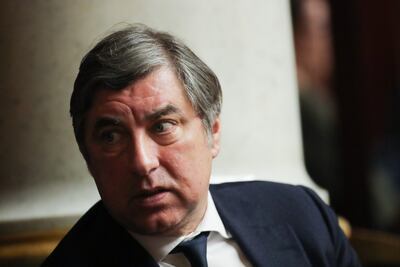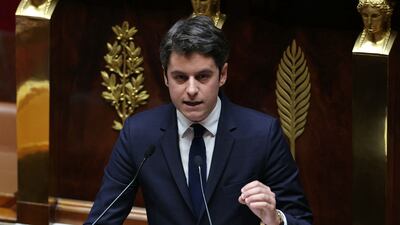The French parliament's lower house on Tuesday voted in favour of President Emmanuel Macron's Ukraine strategy in a symbolic vote that has become became a focal point of political tension before June's European Parliament election.
Speaking before the vote, Prime Minister Gabriel Attal tried to rally support around Mr Macron's choices.
That was despite criticism including from political parties that said they would vote for a bilateral security agreement signed with Ukrainian President Volodymyr Zelenskyy last month.
"A victory of Russia would be a cataclysm for the purchasing power of the French," Mr Attal told politicians. "The success of Ukraine is also in the interest of the French people."
The final count was 372 for and 99 against.
Mr Attal dismissed political parties such as the far-left by saying voting against the motion was a signal of support to Russian President Vladimir Putin.
Mr Attal said abstention, a choice made by the far-right National Rally (RN), which leads Mr Macron's alliance by a wide margin before the June election, was "fleeing responsibilities."
"We are at a tipping point in this conflict," he said.
Russia "is counting on the weariness of Ukraine's allies – it is counting on upcoming elections in the US and Europe".
Mr Attal said that France has delivered military aid worth €3.8 billion to Ukraine in the past two years on a bilateral level and through the EU.
In the coming months, France will produce up to 3,000 shells for Ukraine and deliver weapons including 150 drones, six Caesar cannon, and close to 600 AASM bombs at a rate of about 50 a month, and about 40 Scalp missiles, he said.
MPs clapped as Mr Attal lauded the "exceptional resistance" of the Ukrainian people to the "Russian aggressor", as cameras zoomed in on Ukraine's ambassador to France Vadym Omelchenko, who attended the debate.
However many legislators, including those who said they would vote in support of Mr Macron's Ukraine strategy, described the call for the vote as an attempt to rally support before the European election and weaken the RN by highlighting its ambiguity on Russia.
"The untimely statements of the President have considerably weakened and blurred the voice of France internationally," said Olivier Marleix, president of the conservative Republicans party (LR) at the National Assembly.

Like many others, Mr Marleix criticised Mr Macron for saying last month that sending troops into Ukraine could "not be ruled out."
LR leader, Eric Ciotti, on Sunday said that the President's allies' attempt at "exploiting the conflict in Ukraine for the French European elections is shameful, unworthy and pitiful".
Mr Macron clarified at the time there was no consensus among allies to send soldiers to Ukraine and affirmed his policy of "strategic ambiguity".
But his comments caused worry among European capitals and leaders issued statements disavowing the remarks.
On Monday, Mr Zelenskyy said that there was no need for French troops in his war-torn country as long as "Ukraine holds".
"Your children are not going to die in Ukraine," he said.
RN leader Marine Le Pen said that Mr Zelenskyy's statement was "more reassuring to the French than those of their own President."
"You seem to want to impose that we are either pro-Macron or accused of being pro-Putin," she told Mr Attal. "This attitude … is despicable."
"We need to be very careful", the RN's leader Jordan Bardella said on Tuesday. "Yes to support for Ukraine, but no to war with Russia."
The far-left's La France Insoumise (LFI) accused Mr Macron of unwittingly playing into Mr Putin's hands with his statement on sending troops to Ukraine. The ensuing disavowal from European capitals was described by LFI MP Arnaud Le Gall as "humiliating."
"Strategic ambiguity is incompatible with verbal agitation," said Mr Le Gall, who said his group would vote against Mr Macron's Ukraine strategy.
Allies of the President accused critics of "collective amnesia".
"Some would like everything to stop as quickly as possible, and to restore the false semblance of tranquillity in our relations with Russia," said Laurent Marcangeli, head of the centrist Horizons group.
Mr Attal shot back at criticism aimed at Mr Macron's "warmongering rhetoric", saying he preferred "muscle flexing to lying face down in front of Russia".
"To turn our backs on Ukraine would be to turn our backs on our values," he said before the debate.
"It would be an act of weakness. It would certainly not be peace but, on the contrary, the door opened to new wounds, new wars."
In France's polarised political landscape, Russia's war against Ukraine has emerged as a major hot-button topic.
Mr Macron has been seeking to hammer home the importance of greater support for Ukraine, which is running out of ammunition, insisting that Europe's security is at stake.
In closing statements, Defence Minister Sebastien Lecornu singled out Mr Marleix for highlighting the fact that France, and its European allies, have not sent enough military aid to Ukraine to help it make a recent breakthrough in the war.
Mr Lecornu said a lack of investment in defence spending was the fault of previous governments, which were dominated by either LR or the socialist party.
"I invite us to be as united as possible in this war economy," he said.


